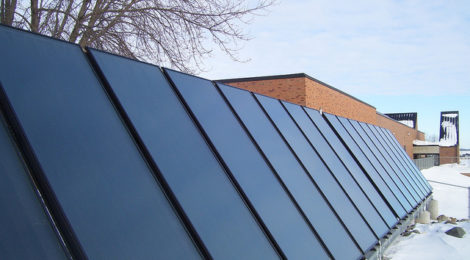
A College Search for Sustainability
By Jeff Ledermann
“Don’t stop the car,” pleaded my oldest daughter, Katie, as we drove around yet another college campus. At the time we were only about halfway through the college search process, but after a half dozen campus visits she was finally starting to formulate some opinions. Unfortunately for the first several visits, they all started with “No.” It would take official visits to 14 different schools, another dozen informal visits, including the aforementioned drive-by, nine applications and letters of acceptance, anxious moments waiting for scholarship notices and lots of discussion on financial matters before her “Decision.” While Katie struggled to sort through the many options before her, a college’s commitment to sustainability was a priority for her from the start.
Having a father who is an environmental professional may have some influence, but many recent high school graduates share Katie’s priority that the college of choice needs to be “green.” The Princeton Review recently reported a “rising interest among students in attending ‘green’ colleges. Among 7,445 college applicants Princeton Review surveyed in 2012 for its “College Hopes & Worries Survey,” 68 percent said having information about a college’s commitment to the environment would impact their decision to apply to or attend a school.” And colleges are responding. As someone that has been working many years to increase environmental literacy in the public, it was exciting to see firsthand how most college campuses have become bastions of sustainability. We found there are lots of ways to learn about the sustainability efforts of colleges. In addition to the Princeton Review’s green ratings and guide to green colleges, we found information from the Association for the Advancement of Sustainability in Higher Education (AASHE), the College Sustainability Report Card (unfortunately, production of new report cards have been suspended), Sierra Club’s Cool Schools ranking and Outside magazine’s college rankings all very helpful.
While crisscrossing the Midwest by car and flying to the Pacific Northwest wasn’t the most environmentally friendly option, we found that actual campus visits were by far the best way to not only get a feel for the whole campus but really test the validity of a school’s commitment to sustainability. While most schools all now have some level of sustainability activities, when on campus it was easy to see which schools have really integrated green initiatives. From green dorm certification to signage in the dining hall regarding healthy local food options, we were most impressed by the schools that did a lot to engage and educate their students about their efforts.
The number of schools adding environmental studies/science programs in recent years was also great to see. I’m a little worried about how all these kids will get jobs in the environmental field, but I am pleased to know that we are building a generation of better stewards. Regardless of their future careers, the environmental knowledge they are gaining now can be applied in any office, home or community. Just to be clear, however, I am encouraging Katie and other environmental studies students to get a second major or area of specialty. When it comes to earning a paycheck, it is good to have options.
While there are lots of factors that go into choosing a college, I am proud that Katie made it a priority to attend a green school. She may not be excited about being surrounded by corn and soybean fields while studying in western Minnesota this fall, but Katie is looking forward to joining her future classmates at a school that is truly committed to a renewable and sustainable college education.
This story originally appeared on the Minnesota Association for Environmental Education (MAEE) blog, which can be found, with other great stories, at minnesotaee.org/e-newsletter. Jeff Ledermann is a founding member of MAEE and MAGI. Photo of solar panels at the University of Minnesota, Morris, courtesy of CERTS via Flickr / Creative Commons. Installation by Energy Concepts of Hudson, Wis. (founded by MAGI member Craig Tarr).